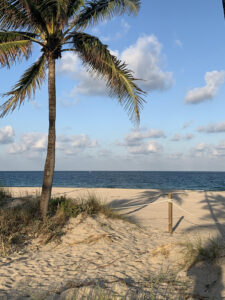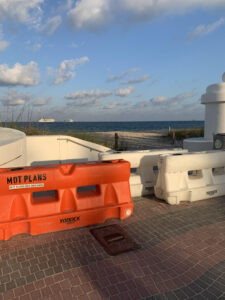
Photo by Darylin Smith
FORT LAUDERDALE — The coronavirus pandemic took a toll on South Florida beaches, especially for the Millennialand Gen Z crowds who traveled to the Sunshine State for spring break.
South Florida is a hot spot for spring breakers. According to Exploring in Florida, spring break is Florida’s biggest source of revenue, bringing in billions annually. Spring break 2020 did not meet expectations for both spring breakers and businesses that benefit from those on a week off from school.
Rashard Woods, a senior healthcare management student at Florida A&M, said his plans for spring break in South Florida were ruined because of COVID-19.
“I was planning to visit South Beach, but I was not able to travel and fulfill my plans that were put in place long before the New Year began,” Woods said.
South Beach in Miami is known for its beaches and glamorous scenery attracting tourists year-round. For spring breakers, it has become an annual experience, one Woods wanted to capture for his YouTube channel.

“I was supposed to create YouTube videos including public interviews with other spring breakers about their experiences on the beach and fun challenges for my channel. In addition to having a good time with my classmates,” Woods said.
Instead of enjoying his spring break on South Beach, Woods was forced to stay in Tallahassee and work.
“As a result of COVID-19 none of my plans went how they were supposed to go and I ended up just staying home going to work every day,” Woods said.
While most of the country began stay-at-home efforts to contain the spread of the novel coronavirus, South Florida was one of the last to begin closures of highly populated areas such as beaches because of spring breakers.
According to a March 18 story in the New York Times, Governor Ron DeSantis was hesitant to begin cancellations during the week of March 15, which also began Florida A&M University’s spring break.
“Mr. DeSantis was at first reluctant to mandate mass cancellations of public events or restrictions on movement. But on Tuesday(March 17), after photos on social media showed crowds of tanned young people sunning shoulder-to-shoulder on the beaches, the Governor shut down bars and nightclubs for a month and ordered restaurants to cut their seating capacity by half. He refused to close beaches, though groups will have to be no larger than 10.”
Hesitating to close South Florida beaches completely, Governor DeSantis began using restrictions. Social distancing no crowds larger than 10, limiting access to beaches in the evening, and even barricading areas of beaches. This did not last very long.”
According to a March 23 article in the Orlando Sentinel, DeSantis ordered the closure of all Broward County and Miami-Dade County beaches effective March 20.
“Gov. DeSantis closed all beaches in Broward County in an announcement on Friday(March 20). Fort Lauderdale Beach, Lauderdale-by-the-Sea, Pompano Beach, Deerfield Beach, Dania Beach, Hallandale Beach, and Hollywood Beach. Miami-Dade County: Closed. Miami Beach will close the beach from Fifth Street to 15th Street —the trendy section known as South Beach.”

With the number of confirmed COVID-19 infections increasing rapidly, states such as California and New York have imposed statewide shutdowns of all non-essential businesses, Florida isn’t one of them — at least as of Friday, March 27.
In numerous counties including Broward and Miami-Dade, DeSantis has issued the closure of non-essential businesses and some are even under shelter-in-place orders, but not the state as a whole.
According to a March 23 article by NBC Miami, DeSantis said he didn’t see the need to impose a state shutdown.
“Governor DeSantis said about a third of Florida’s 67 counties have no confirmed cases and another third have few, so he doesn’t yet see the need to impose a near shutdown on their businesses that have been imposed in large counties such as Miami-Dade, Broward and Palm Beach where the disease has spread into the community,” according to the TV station.
Not all spring breakers were forced to cancel their plans. Some still got to experience South Beach before the closures. Amari Cunningham, a sophomore pre-physical therapy student at FAMU, happened to be one of the lucky ones.
“I arrived in Miami on March 13 and I was able to visit South Beach for a day. It was crowded but fun. Because of COV ID-19, there were barricades, heavy police presence, caution tape, street shutdowns, curfews and time limits,” Cunningham said.
For updates on Florida during the coronavirus pandemic, go to https://floridahealthcovid19.gov/